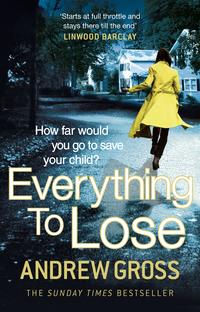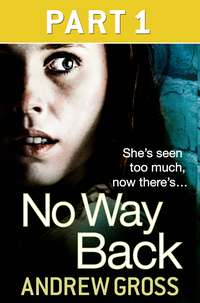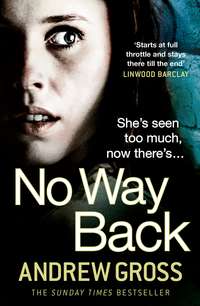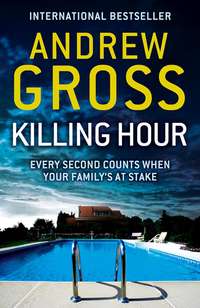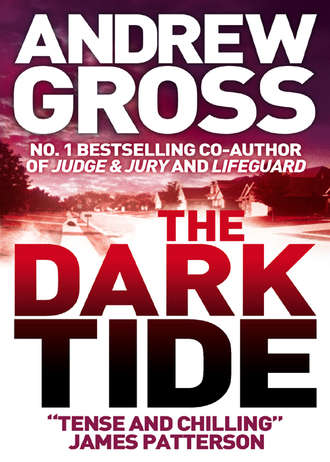
Полная версия
The Dark Tide
Rhiannon rings like a bell through the night / And wouldn’t you love to love her.
It was why he’d moved back up here, four years ago. After the accident, after his marriage had broken up. Some said that it was running away. Hiding out. And maybe it was, just a little. So the hell what?
He was head of the Violent Crimes Unit on the Greenwich police force. People relied on him. Was that running away? Sometimes he took the boat out for an hour or so before work in the rosy predawn calm and fished for blues and striped bass. Was that?
He had grown up here. In middle-class Byram, near Port Chester by the New York border, only a few miles but a lifetime away from the massive estates that now lined the way out to backcountry, gates he now drove through to follow up on some rich kid who had tipped over his sixty-thousand-dollar Hummer.
It was all different now. The countrified families who had grown up there in his youth had given way to thirty-something hedge-fund zillionaires who tore the old homes down and built enormous castles behind iron gates, with lake-size pools and movie theaters. Everyone with money was coming in. Now Russian moguls—who even knew where their wealth was from?—were buying up horse-country estates in Conyers Farm, putting in helicopter pads.
Billionaires ruining things for millionaires. Hauck shook his head.
Twenty years ago he’d been a running back at Greenwich High. Then he went on and played at Colby, Division III. Not exactly Big Ten, but the fancy degree got him fast-tracked into the NYPD detectives’ training program, which made his dad, who worked his whole life for the Town of Greenwich Water Authority, proud. He’d cracked a couple of high-profile cases and moved up. Later on he worked for the department’s Information Office when the Trade Towers were hit.
So now he was back.
As he chugged into the harbor, the manicured lawns of Belle Haven to his left, a couple of small boats cruised past him on their way out—doing the same thing he was doing, heading to work on Long Island across the sound, a half hour’s ride away.
Hauck waved.
And he liked it here now, though a lot of pain had left its mark in between.
It was lonely since he and Beth had split up. He dated a bit: a pretty secretary to the CEO at General Reinsurance, a marketing gal who worked at Altria for a while. Even one or two gals on the force. But he’d found no one new to share his life with. Though Beth had.
Occasionally he hung out with a few of his old buddies from town, a couple who had made bundles building homes, some who just became plumbers or mortgage brokers or owned a landscaping company. “The Leg,” that’s what everyone still called him—with a soft g, as in “Legend.” Old-timers, who still recalled him busting two tackles into the end zone to beat Stamford West for the Lower Fairfield County crown, still toasted that as the best game they’d ever seen anyone play here since Steve Young and bought him beers.
But mostly he simply felt free. That the past hadn’t followed him up here. He just tried to do a little good during the day, cut people a break. Be fair. And he had Jessica, who was ten now, up on weekends, and they fished and kicked soccer balls around on Tod’s Point and had cookouts there. Sunday afternoons, in his eight-year-old Bronco, he’d drive her back to where she lived now, in Brooklyn. Friday nights in the winter, he played hockey in the local over-forty league.
Basically he tried to push it back a little each day—time, that is—trying to find himself back to that point before everything caved in on him. That moment before the accident. Before his marriage collapsed. Before he gave up.
Why go back there, Ty?
Hard as you tried, you could never quite push it back all the way. Life didn’t afford you that.
Hauck caught sight of the marina at the Indian Harbor Yacht Club, where the dock manager, Hank Gordon, an old buddy, always let him put in for the day. He picked up the radio. “Heading in, Gordo …”
But the marina manager was waiting for him out on the pier.
“What the hell are you doing here, Ty?”
Hauck yelled to him, “Summer hours, guy!” He reversed and backed the Merrily in. Gordo tossed a bowline to him and reeled him in. Hauck cut the engine. He went out to the stern as the boat hit the buoy and hopped onto the pier. “Like a dream out there today.”
“A bad dream,” Hank said. “Lemme take it from here, Ty. You better get your ass up that hill.”
There was something on the dock manager’s face that Hauck couldn’t quite read. He glanced at his watch—8:52. Usually he and Gordo shot the shit a few minutes, about the Rangers or what had made it onto the police blotter the night before.
That’s when Hauck’s cell phone started to beep. The office. Two-three-seven.
Two-thirty-seven was the department’s emergency code.
“You didn’t have the radio on, did you?” Gordo asked, securing the line.
Hauck shook his head blankly.
“Then you haven’t heard what the hell happened out there, have you, Lieutenant?”
CHAPTER FIVE
Karen didn’t flip out at first. That wasn’t her way. She told herself over and over to stay calm. Charlie could be anywhere. Anywhere.
You don’t know for sure if he was even on that train.
Like a few years back, when Samantha was four or five, and they thought they’d lost her at Bloomie’s. And after a frantic, heart-constricting search, retracing their steps, calling for the manager, and starting to accept the reality that something horrible had happened—that this wasn’t a false alarm!—there she was, their little Sammy, waving hi to Mommy and Daddy, paging through one of her favorite books atop a pile of Oriental rugs, as innocent as if she were on a stage at school.
This could be just like that, Karen reassured herself now. Stay calm, Karen. Goddamn it, just stay calm!
She ran back into the yoga studio, found her purse, and fumbled around for her phone. Heart pumping, she punched in Charlie’s number on the speed dial. C’mon, c’mon…. Her fingers barely complied.
As she waited for the call to connect, she tried her best to flash through her husband’s schedule that morning. He’d left the house around seven. She’d been finishing her hair. Ten minutes into town, ten minutes at the dealership dropping off the car, going over what had to be done. So that was, what—7:20? Another ten or so to the station. The news said the explosion had occurred at 8:41. He could have made an earlier train. Or even ended up getting a loaner and driving in. For a second, Karen allowed herself to feel uplifted. Anything was possible…. Charlie was the most resourceful man she knew.
His phone began to ring. Karen saw that her hands were shaking. C’mon, Charlie, answer….
To her dismay, his voice recording came on. “This is Charlie Friedman….”
“Charlie, it’s me,” Karen blurted. “I’m really worried about you. I know you took the train in. You’ve got to call me as soon as you get this. I don’t care what you’re doing, Charlie. Just call, hon….”
She pressed the end button feeling totally helpless.
Then she realized—there was a voice-mail message on her phone! Blood racing, she scrolled immediately to Recently Received Calls.
It was Charlie’s number! Thank God! Her heart almost climbed up her throat in joy.
Anxiously, Karen punched in her code and pressed the receiver to her ear. His familiar voice came on and it was calm. “Listen, hon, I thought as long as I’m gonna be in Grand Central, I’d pick up some of those marinated steaks you like at Ottomanelli’s on the way home and we’d grill instead of going out…. Sound good? Lemme know. I’ll be in the office by nine. I got hung up. Madhouse at the dealership. Bye.”
Karen stared at the message screen—8:34. He was heading into Grand Central when he made the call. Still on the train. The sweats began to come over her again. She looked back outside at the monitor, at the pall of smoke building over Grand Central, the chaos and confusion on the screen.
Suddenly she knew in her heart. She couldn’t deny it anymore.
Her husband was on that train.
Unable to control herself any longer, Karen punched in the speed code to her husband’s office. C’mon, c’mon, she said over and over during the agonizing seconds it took for the call to connect. Finally Heather, Charlie’s assistant, picked up.
“Charles Friedman’s office.”
“Heather, it’s Karen.” She tried to control herself. “By any chance has my husband come in?”
“Not yet, Mrs. Friedman. He left me an e-mail earlier from his BlackBerry saying that he had to take his car in or something. I’m sure I’ll be hearing from him soon.”
“I know he had to take his car in, Heather! That’s what I’m worried about. Have you seen the news? He said he was taking the train.”
“Oh, my God!” His assistant gasped, reality setting in. Of course she’d seen it. They all had. The whole office was watching it now.
“Mrs. Friedman, let me try and get him on the phone. I’m sure it’s got to be crazy around Grand Central. Maybe he’s on his way over and the phones just aren’t functioning. Maybe he took a later train—”
“I got a call from him, Heather! At eight thirty-four. He said they were pulling into Grand Central in a while….” Her voice was shaking. “That was eight thirty-four, Heather! He was on it. Otherwise he would have called. I think he was on that train….”
Heather begged her to stay calm and said she would e-mail him, that she was sure she’d hear from him soon. Karen nodded okay, but when she put down the phone, her heart was racing and her blood was pumping out of control and she had no idea what to do next. She pressed the phone to her heart and dialed his number one more time.
C’mon, Charlie…. Charlie, please …
Outside Grand Central, the news reporter was confirming that it had been at least one bomb. A few survivors had staggered out of the station. They were gathered on the street, dazed, faces smeared with blood and black with soot. Some were muttering something about Track 109, that there’d been at least two powerful explosions and a fire raging down there, with lots of people still trapped. That something had gone off in the first two cars.
Karen froze. That’s when tears finally started to roll down her cheeks.
That’s where Charlie always sat. It was like a ritual with him. He always camped out in the first car!
C’mon, Charlie…. Karen pleaded silently, watching the screen outside. People are making it out. Look, they’re interviewing them.
She punched his number in again, her body giving over to full-out panic.
“Answer the fucking phone, Charlie!”
CHAPTER SIX
Her thoughts flashed to Samantha and Alex. Karen realized she had to get home.
What could she possibly tell them? Charlie always drove in. He had a spot in his building’s garage. He’d been doing it for years.
That this was the one goddamn morning he picked to take the train!
Karen crumpled her sweat top into her bag and ran out, past the front counter, through the outer glass doors. She hurried over to where her Lexus was parked, the hybrid Charlie had bought her barely a month ago. The console still smelled new. She flicked the automatic lock on her key chain and jumped in.
Her house was about ten minutes away. Pulling out of the lot, Karen kept the Blue Tooth phone on automatic dial to Charlie’s cell. Please, Charlie, please, answer the goddamn phone!
Her heart kept sinking. “This is Charlie Friedman….”
Tears rolled down her cheeks as she pushed back her worst fears. This can’t be happening!
Karen made a sharp right out of the Sportsplex’s lot onto Prospect, cut the light at the corner, accelerating onto I-95. Traffic was backed up, slowing everything headed into downtown Greenwich.
All sorts of new, conflicting reports were coming in. The radio said that multiple explosions had taken place. That there was a fire on the tracks, burning out of control. That the intense heat and the possibility of noxious fumes made it impossible for firefighters even to get close. That there were significant casualties.
It was starting to scare Karen to death.
He could be trapped down there. Anywhere. He could be burned or injured, unable to get out. On his way to a hospital. There were a hundred fucking scenarios that could possibly be playing out. Karen pressed the speed dial again.
“Where are you, goddamn it, Charlie? Come on, please….”
Her mind flashed again to Alex and Samantha. They wouldn’t have any idea. Even if word had spread to them, it wouldn’t occur to them. Charlie always drove.
Karen pulled off the highway at Exit 5, Old Greenwich, and onto the Post Road. Suddenly her car phone beeped. Thank God! Her heart almost leaped out of her chest.
But it was only Paula, her best friend, who lived nearby in Riverside, only a few minutes away.
“You hear what’s going on?” The sound of the TV was blaring in the background.
“Of course I’ve heard, Paula. I—”
“They’re saying it was from Greenwich. There might even be people we—”
“Paula.” Karen interrupted her. She could barely force the words out of her mouth. “I think Charlie was on that train.”
“What?”
Karen told her about the car and not being able to reach him. She said she was heading home and wanted to keep the lines free, in case he or his office might call.
“Of course, honey. I understand. Kar, he’s going to be okay. Charlie always comes out okay. You know that, Kar, don’t you?”
“I know,” Karen said, though she knew she was lying to herself. “I know.”
Karen drove through town, her heart beating madly, then turned onto Shore Road near the sound. Then Sea Wall. Half a block down, she jerked the Lexus into her driveway. Charlie’s old Mustang was pulled into the third bay of the garage, just as she’d left it an hour earlier. She ran through the garage and into the kitchen. Her hope was momentarily raised by a message light flashing on the machine. Please … she prayed to herself, and pushed the play button, her blood pulsing with alarm.
“Hey, Mrs. Friedman …” a dull voice came over the speaker. It was Mal, their plumber, droning on and on about the water heater she’d wanted to have fixed, about some goddamn valve he was having a bitch of a time finding. Tears ran down Karen’s cheeks as her legs started to give out, and she pressed herself to the wall and sank helplessly onto the floor. Tobey wagged his way up, nuzzling into her. She mashed her tears with the palms of her hands. “Not now, baby. Please, not now….”
Up on the counter, Karen fumbled for the remote. She flicked on the TV. The situation had gotten worse. Matt Lauer was on the screen—with Brian Williams now—and the reports were that there were dozens of casualties down on the tracks, that the fire was spreading and uncontained. That some of the lower part of the building had collapsed, and while they were flashing to some expert about Al Qaeda and terrorism, they split-screened to the dark cloud seeping into the Manhattan sky.
He would’ve called them, Karen knew, at least Heather at the office—if he was okay. Maybe even before he would’ve called her. That’s what scared her most. She closed her eyes.
Just be okay, Charlie, wherever you are. Just be okay.
A car door slammed outside. Karen heard the doorbell ring. Someone called out her name and came running into the house.
It was Paula. She fixed on Karen huddled on the floor, in a way she had never seen her before. Paula sank down next to her, and they just hugged each other, tears glistening on each other’s cheeks.
“It’s gonna be okay, honey.” Paula stroked Karen’s hair. “I know it will. There could be hundreds of people down there. Maybe the phones aren’t working. Maybe he needed some medical attention. Charlie’s a survivor. If anyone’s gonna get out, it’s him. You’ll see, baby. It’s gonna be okay.”
And Karen kept nodding back and repeating, “I know, I know,” wiping the tears with her sleeve.
They called over and over. What else was there to do? Charlie’s cell phone. His office. Maybe thirty, forty times.
At some point Karen even sniffled back a smile. “You know how mad Charlie gets when I bug him at the office?”
By nine forty-five they had settled onto the couch in the family room. That’s when they heard the car pull up and more doors slamming. Alex and Samantha burst in through the kitchen with a shout. “School’s closed!”
They stuck their heads into the TV room. “You heard what happened?” Alex said.
Karen could barely answer. The sight of them struck terror in her heart. She told them to sit down. They could see that her face was raw and worried. That something was terribly wrong was written all over it.
Samantha sat down across from her. “Mom, what’s wrong?”
“Daddy took the car in this morning,” Karen said, “for service.”
“So?”
Karen swallowed back a lump, or she was sure she would start to cry. “Afterward,” she paused, “I think he went into the city by train.”
Both kids’ eyes went wide and followed hers, as if drawn, to the wide screen.
“He’s there?” her son asked. “At Grand Central?”
“I don’t know, baby. We haven’t heard from him. That’s what’s so worrisome. He called and said he was on the train. That was eight thirty-four. This happened at eight forty-one. I don’t know….”
Karen was trying so hard to appear positive and strong, trying with all her heart not to alarm them, because she knew with that same unflinching certainty that any moment Charlie would call, tell them he had made it out, that he was okay. So she didn’t even feel the trail of tears carving its way down her cheeks and onto her lap, and Samantha staring at her, jaw parted, about to cry herself. And Alex—her poor, macho Alex, white as parchment—eyes glued to the horrifying plume of smoke elevating into the Manhattan sky.
For a while no one said a word. They just stared, all in their own world between denial and hope. Sam, arms hung loosely around her brother’s neck, her chin resting nervously on his shoulder. Alex, grasping Karen’s hand for the first time in years, watching, waiting for their father’s face to emerge. Paula, elbows on knees, poised to shout and point, Look, there he is! Jump up in glee. Waiting with all the certainty in the world to hear the phone she was sure was about to ring.
Alex turned to Karen. “Dad’s gonna make it out of there? Isn’t he, Mom?”
“Of course he is, baby.” Karen squeezed his hand. “You know your father. If anyone will, it’s him. He’ll make it out.”
That was when they heard a rumble. On the screen the camera shook from another muffled explosion. Onlookers gasped and screamed as a fresh cloud of dense black smoke emerged from the station.
Samantha wailed, “Oh, God …”
Karen felt her stomach fall. She cupped Alex’s fist tightly and squeezed. “Oh, Charlie, Charlie, Charlie …”
“Secondary explosions …” muttered a fire chief coming out of the station, his head shaking with a kind of finality. “There are many, many bodies down there. We can’t even get our people close.”
CHAPTER SEVEN
Around noon
When the call came in, Hauck was on the phone with the NYPD’s Emergency Management Office in the city.
Possible 634. Leaving the scene of an accident. West Street and the Post Road.
All morning long he’d kept a close tab on the mess going on in the city. Panicked people had been calling in all day, unable to reach their loved ones, not knowing what else to do. When the Trade Towers were hit, he’d been working for the department’s Office of Information, and it had been his job for weeks afterward to track down the fates of people unaccounted for—through the hospitals, the wreckage, the network of first responders. Hauck still had friends down there. He stared at the list of Greenwich names he’d taken down: Pomeroy. Bashtar. Grace. O’Connor.
The first time around, out of the hundreds unaccounted for, they had found only two.
“Possible 634, Ty!” the day sergeant buzzed in a second time. Hit and Run. Down on the Post Road, by West Street, near the fast-food outlets and car dealerships.
“Can’t,” Hauck said back to her. “Get Muñoz on it. I’m on something.”
“Muñoz is already on the scene, Lieutenant. It’s a homicide. It seems you got a body down there.”
It took only minutes for Hauck to grab his Grand Corona out of the lot outside, shoot straight up Mason, his top hat flashing, to the top of the avenue by the Greenwich Office Park, then down the Post Road to West Street, across from the Acura dealership.
As he was the head of Violent Crimes in town, this was his call. Mostly his department broke up spats at the high school, the occasional report of a break-in, marital rows. Dead bodies were rare up here in Greenwich.
Stock fraud was a lot more common.
At the bottom of the avenue, four local blue-and-whites had blocked off the busy commercial thoroughfare, their lights ablaze. Traffic was being routed into one lane. Hauck slowed, nodding to a couple of patrolmen he recognized. Freddy Muñoz, one of the detectives on his staff, came over as Hauck got out.
“You gotta be kidding, Freddy.” Hauck shook his head in disbelief. “Today of all days …”
The detective made a grim motion toward a covered mound in the middle of West Street, which intersected the Post Road and cut up to Railroad Avenue and I-95.
“It look like we’re kidding, LT?”
The patrol cars had parked in a way that formed sort of a protective circle around the body. An EMS truck had arrived, but the tech was standing around waiting for the regional medical team out of Farmington. Hauck knelt and peeled back the plastic tarp.
Christ! His cheeks puffed out a blast of air.
The guy was just a kid—twenty-two, twenty-three at most—white, wearing a brown work uniform, long red locks braided in cornrows in the manner of a Jamaican rasta. His body was twisted so that his hips were swung over slightly and raised off the pavement, while his back was flat, face upward. The eyes were open, wide, the moment of impact still frozen in their pupils. A trickle of blood ran onto the pavement from the corner of the victim’s mouth.
“You got a name?”
“Raymond. First name Abel. Middle name John. Went by AJ, his boss at the auto-customizing shop over there said. That’s where he worked.”
A young uniformed officer was standing nearby with a notepad. His nameplate read STASIO. Hauck assumed he’d been first on the scene.
“He was just off-shift,” Muñoz said. “Said he was going out to buy some smokes and make a call.” He pointed across the street. “Seems like he was headed into the diner over there.”
Hauck glanced over to a place he knew called the Fairfield Diner, an occasional police hangout. He’d grabbed a meal there a couple of times himself.
“What do we know about the car?”
Muñoz called over Officer Stasio, who looked about a month removed from training, and who read, a little nervously, from his spiral pad. “It appears like the hit-car was a white SUV, Lieutenant. It was traveling north up the Post Road and turned sharply onto West Street here…. Ran into the vic just as he was crossing the street. We got two eyewitnesses who saw the whole thing.”
Stasio pointed to two men, one stocky, sport coat, mustached, sitting in the front seat of an open patrol car rubbing his hair. The other in a blue fleece top talking to another officer, somberly shaking his head. “We located one in the parking lot of the Arby’s over there. An ex-cop, it turns out. The other came from the bank across the street.”




